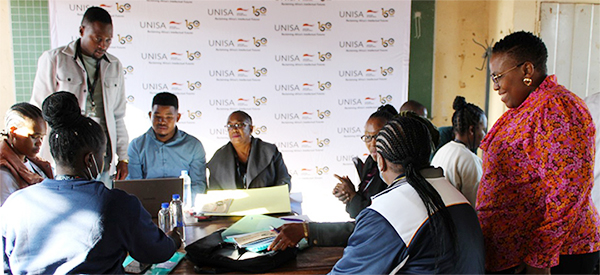College of Education
A response to the reading crisis: Enhancing language teaching by integrating technology
The most recent (2021) Progress in International Reading Literacy Study (PIRLS) revealed that a staggering 81% of Grade 4 learners in South Africa (SA) were unable to read for meaning in any language – a rise from 78% in 2016. Because of this, the English First Additional Language (EFAL) Engaged Scholarship (ES) team from the Department of Curriculum and Instructional Studies, within the College of Education at the University of South Africa recently offered in-service training over three days for Intermediate and Senior Phase (Grades 4 - 7) teachers in the Kgakotlou District of the Limpopo Province.

Unisa College of Education staff members training teachers in new teaching methods
"Engaged scholarship" refers to a collaborative approach to research and community engagement that aims to address real-world issues. The initiative taken by the English First Additional Language (EFAL) Engaged Scholarship (ES) team to train teachers on integrating technology into teaching English is a proactive response to the findings of the latest PIRLS study, demonstrating a commitment to improving educational outcomes through innovative teaching practices.
Prof Margaret Maja, the Chair of the EFAL ES team, says: "In an era driven by technology, education has evolved to incorporate digital tools to enhance learning experiences. Teachers play a vital role in fostering language development among students by integrating technology into language teaching." The EFAL ES team included Christy Kotze, Dr Makwalete Malatji, Dr Samson Tshabalala, Victor Nkuna, Dr Nduduzo Gcabashe, Katherine Naidoo, Cynthia Tsebe and Prof Mapheleba Lekhetho.
The primary objective of the training programme was to equip teachers with innovative practices that merge traditional teaching methods with modern technological tools. Educators could create dynamic and engaging lessons that cater to students' diverse learning needs by integrating technology into language teaching. The programme included the following key topics:
- Listening and speaking: Utilising interactive audio and video materials to improve listening comprehension and speaking skills,
- Reading and viewing: Integrating e-books, online articles, and multimedia resources to encourage reading fluency and visual literacy,
- Writing and presenting: Incorporating word-processing software, digital storytelling tools, and presentation platforms to develop writing skills and enhance oral communication and
- Language structures and conventions: Using online grammar resources, language learning apps, and interactive games to reinforce language rules and conventions. Lastly, the all-important classroom library was discussed. The training session also included an information session facilitated by Unisa's North Eastern Region, presented by Bessie Molokomme.
Dr Malesela Sepuru, the Kgakotlou Circuit manager, said in his address at the closing ceremony that by incorporating technology into language teaching, teachers can create a more engaging and interactive learning environment for learners. Tlhakola, the project coordinator on behalf of the Kgakotlou Circuit, agreed and added that technology provides opportunities for personalised learning, immediate feedback and collaborative activities that can enhance language acquisition and retention among learners.
Training Grades 4 to 7 teachers in integrating technology into English First Additional Language instruction is a progressive step towards enhancing language education. By harnessing the power of technology, educators can inspire students, foster creativity and cultivate a deep appreciation for the English language. The training allows teachers to empower the next generation of language learners with the skills they need to succeed in an increasingly digital world. The sessions were hosted at the Mothiba Primary School.
* By Dineo Horner, Department of Curriculum and Instructional Studies
Publish date: 2024/06/18

 Unisa co-hosts G20 community outreach in the Eastern Cape
Unisa co-hosts G20 community outreach in the Eastern Cape
 Unisans gain membership of prestigious science academies
Unisans gain membership of prestigious science academies
 Advocating for disability transformation through servant leadership
Advocating for disability transformation through servant leadership
 Unisa Press continues to illuminate the publishing space
Unisa Press continues to illuminate the publishing space